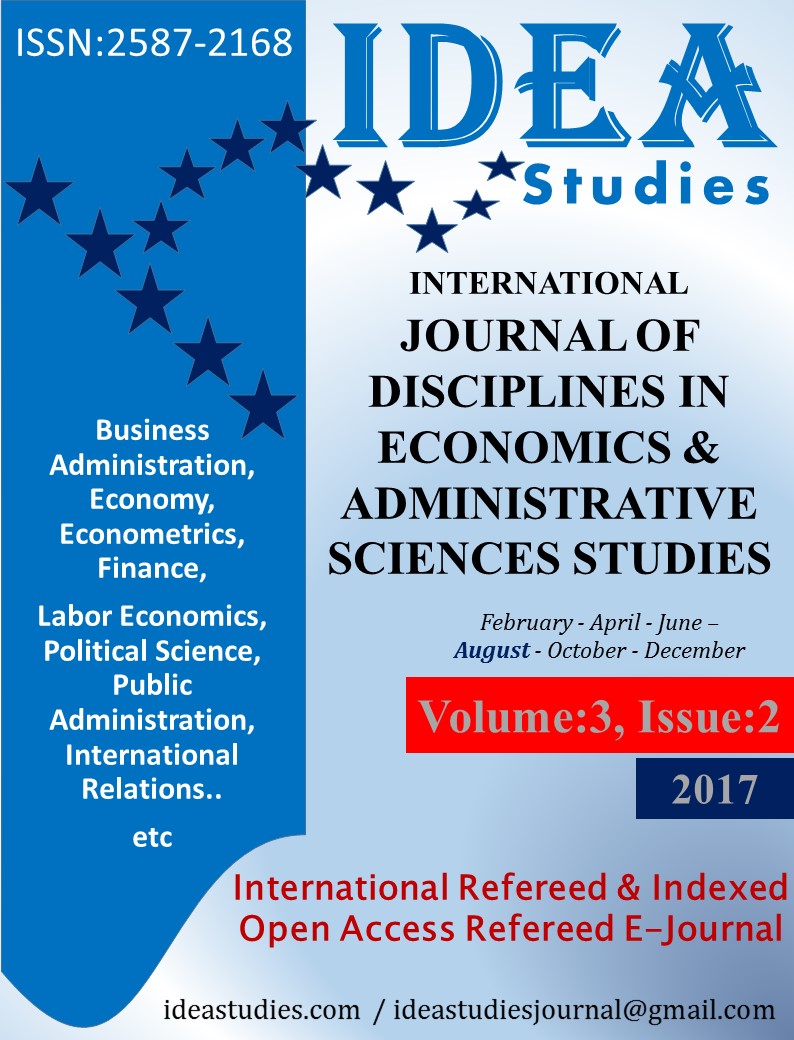Author :
Abstract
Akademik başarı mutluluk pahasına mı gerçekleşmektedir? Yoksa akademik anlamda başarılı olmak bireyleri daha mı fazla mutlu etmektedir? Bu soruların cevabının verilmesi ve bu iki değişken arasındaki ilişkinin düzeyinin tespiti; gerek mutluluk düzeyi yüksek, gerekse başarılı bir toplumun oluşmasında önem arz etmektedir. Bu bağlamda çalışmada, Kırıkkale Üniversitesi İktisadi İdari Bilimler Fakültesi’nde okuyan öğrencilerin akademik başarıları ve mutlulukları arasındaki ilişki incelenmiştir. Bu amaçla, literatür taraması ardından anket formu oluşturulmuş, akademik başarı ölçütü olarak öğrencilerin genel not ortalaması, mutluluk ölçütü olarak ise, literatürde sıkça kullanılan ve hazır ölçeklerden olan “Oxford Mutluluk Ölçeği” kullanılmıştır. Saha çalışmasında, 420 üniversite öğrencisine anket uygulanmış, bu anketlerden 127’si kontrol değişkenleri aracılığıyla analiz dışı bırakılmış ve örneklem çapı 293olarak belirlenmiştir. Bulgular bölümünde analiz olarak betimsel ve çıkarımsal istatistiksel yöntemler (Bağımsız Örneklem t-Testi, Tek Yönlü Varyans Analizi, Pearson Korelasyon Katsayısı) kullanılmıştır. Analiz sonucunda mutluluğun; öğrencilerin cinsiyetine, gelir durumuna, ikamet ettikleri yere ve derse devam durumların göre farklılaşmadığı sonucuna %5 anlamlılık düzeyi ile ulaşılmıştır. Ayrıca bulgular, öğrencilerin başarı durumunun, öğrencinin cinsiyetine, gelir durumuna ve ikamet ettiği yere bağlı olarak değişmediğine işaret etmektedir. Öğrencilerin derse devam durumuna göre ise başarı düzeyinin değiştiği sonucuna ulaşılmıştır.
Keywords
Abstract
Does academic success realize at the expense of happiness? Or, does being success in academic sense make the people happier? Answering to these questions and measuring the level of the relationship between these two variables become more of an issue in terms of the formation of either successful or high level happy society. In this context, this study examines the relationship between academic success and happiness of students studying in the Faculty of Economics and Administrative Sciences in Kırıkkale University. To this end, in the pursuit of literature review, a questionnaire was created and the students' average grade-point average was used as a measure of academic success while the "Oxford Happiness Scale" available and frequently used in the literature was used as a measure of happiness. In the field work, the questionnaire was conducted on 480 students and 127 of these sample were leaved out of assessment by controlled variables, and the sample size in this study was determined as 293. In the section of the findings, descriptive and inferential statistical methods (Independent Sample t-Test, One-Way Analysis of Variance, Pearson Correlation Coefficient) were made use of as an analysis. The result of the analysis reveals in 5% significance level that happiness does not differ by student’s gender, income levels, residence and class attendance status. The findings also point out that students' success does not change depending on the student's gender, income status and residence. But, as for and class attendance status, it is come to conclusion that it changes the student’s success level.
Keywords
- Alavi, H. R. (2007). “Correlatives of happiness in the university students of Iran (a religious
- Alavi, H. R. (2007). “Correlatives of happiness in the university students of Iran (a religious approach)”, Journal of Religion and Health, 46(4), 480-499.
- Diener, Ed, & Seligman, Martin EP. (2002). “Very Happy People”, Psychological science 13.1: 81- 84.
- Francis, L. J., Sahin, A., & Al-Failakawi, F. (2008). “Psychometric Properties of Two IslamicMeasures among Young Adults in Kuwait: The Sahin-Francis Scale Of Attitude Toward Islam and The Sahin Index Of Islamic Moral Values”, Journal of Muslim Mental Health, 3(1), 9 - 24.
- Gilman, R. & Huebner, E. S. (2006). “Characteristics of Adolescents who Report Very High Life Satisfactio”, Journal of Youth and Adolescence, 35(3), 311 - 319.
- Hassanzadeh, R., & Mahdinejad, G. (2013). “Relationship Between Happiness and Achievement Motivation: A Case of University Students”, Journal of Elementary Education, 23(1), 53 - 65.
- Hoggard, L. (2005). How to be happy?, Random House, London.
- Huebner, E.S. & Alderman, G.L. (1993). “Convergent and Discriminant Validation of a Children’sLife Satisfaction Scale: Its Relationship to Self- and Teacher-Reported Psychological Problems and School Functioning”, Social Indicators Research, 30, 71-82.
- Lyubomirsky, S., King, L., & Diener, E. (2005). “The Benefits of Frequent Positive Affect: Does Happiness Lead to Success?”, Psychological Bulletin, 131(6), 803-855.
- Malik, M., Nordin, N., Zakaria, A., & Sirun, N. (2013). “An Exploratory Study on the Relationshipbetween Life Satisfaction and Academic Performance among Undergraduate Students of UiTM, Shah Alam”, Procedia-Social and Behavioral Sciences, 90, 334-339.
- Quinn, P. D., & Duckworth, A. L. (2007). “Happiness and academic achievement: Evidence for reciprocal causality”, In the Annual Meeting of the American Psychological Society, 24 - 27.
- Verkuyten, M. & Thijs, J. (2002). “School Satisfaction of Elementary School Children: The Role ofPerformance, Peer Relations, Ethnicity, and Gender”, Social Indicators Research, 59(2), 203-228.Zhang, J., & Kemp, S. (2009). “The Relationships between Student Debt and Motivation, Happiness, and Academic Achievement”, New Zealand Journal of Psychology, 38(2), 24 - 29.





